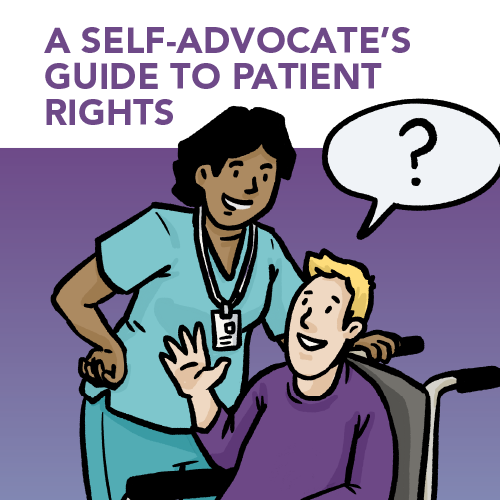A Self-Advocate’s Guide To Patient Rights
Click the blue questions to read the answer. Last Revised: August 2023
-
This guide is to help you get your needs met at healthcare visits. You have the power to advocate for yourself.
-
The Americans with Disabilities Act (ADA) is a law that says that people with disabilities cannot be treated unfairly.
It also states that people get equal entry to public settings.
-
The Right To Be Treated With Respect.
You have the right to be listened to.
To be treated kindly by people.
To have your values and ideas respected.
To have your privacy respected.
The Right to Get Your Medical Records.
You have a right to get a copy of your health information if you ask.
Most offices have a “patient portal.” A patient portal can help you access your health information online. You can ask your provider to help you sign in. Or you can request your health information through an email or letter.
The Right to Privacy of Your Medical Records.
This gives you the right to your own health information, in all forms.
There are rules to who can see or receive your information. Your records can’t be shared with just anyone.
The Right to Make Choices About Your Care.
You have the right to ask about side-effects.
You have the right to say “yes” or “no” to medication and medical procedures.
You can say no even if it will save your life.
The right to a support person at doctor appointments.
You have the right to go alone or bring a support person with you during doctor visits. A support person can be a friend, family member, or support staff.
They can help with notes or questions.
They can be a second set of ears for you.
The Right to Informed Consent.
You have the right to ask questions about your health until you understand what you need to know to make choices about your health.
The Right to Make Decisions About End-of-Life Care
This gives you the right to information about end-of-life care.
This means respect will be given to your care choices.
You have the right to create an advance directive. An advance directive is a document that tells people how you’d like to be treated in an emergency or when you die.
You will be provided access to hospice care. Hospice care helps people feel comfortable as they are dying.
Sources:
How to Get Your Medical Records | VTLawHelp.org. (n.d.). https://vtlawhelp.org/how-get-your-medical-records


